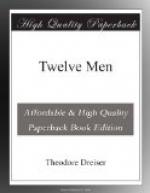Some time later, disagreeing with the firm as to the conduct of the magazine, I left—really was forced out—which raised a little feeling on my part; not on his, I am sure, for I was very difficult to deal with.
Time passed and I heard nothing. I had been able to succeed in a somewhat different realm, that of the magazine contributor, and although I thought a great deal of my brother I paid very little attention to him or his affairs, being much more concerned with my own. One spring night, however, the following year, as I was lying in my bed trying to sleep, I heard a quartette of boys in the distance approaching along the street in which I had my room. I could not make out the words at first but the melody at once attracted my attention. It was plaintive and compelling. I listened, attracted, satisfied that it was some new popular success that had “caught on.” As they drew near my window I heard the words “On the Banks of the Wabash” most mellifluously harmonized.
I jumped up. They were my words! It was Paul’s song! He had another “hit” then—“On the Banks of the Wabash,” and they were singing it in the streets already! I leaned out of the window and listened as they approached and passed on, their arms about each other’s shoulders, the whole song being sung in the still street, as it were, for my benefit. The night was so warm, delicious. A full moon was overhead. I was young, lonely, wistful. It brought back so much of my already spent youth that I was ready to cry—for joy principally. In three more months it was everywhere, in the papers, on the stage, on the street-organs, played by orchestras, bands, whistled and sung in the streets. One day on Broadway near the Marlborough I met my brother, gold-headed cane, silk shirt, a smart summer suit, a gay straw hat.
“Ah,” I said, rather sarcastically, for I still felt peeved that he had shown so little interest in my affairs at the time I was leaving. “On the banks, I see.”
“On the banks,” he replied cordially. “You turned the trick for me, Thee, that time. What are you doing now? Why don’t you ever come and see me? I’m still your brother, you know. A part of that is really yours.”
“Cut that!” I replied most savagely. “I couldn’t write a song like that in a million years. You know I couldn’t. The words are nothing.”
“Oh, all right. It’s true, though, you know. Where do you keep yourself? Why don’t you come and see me? Why be down on me? I live here, you know.” He looked up at the then brisk and successful hotel.
“Well, maybe I will some time,” I said distantly, but with no particular desire to mend matters, and we parted.




